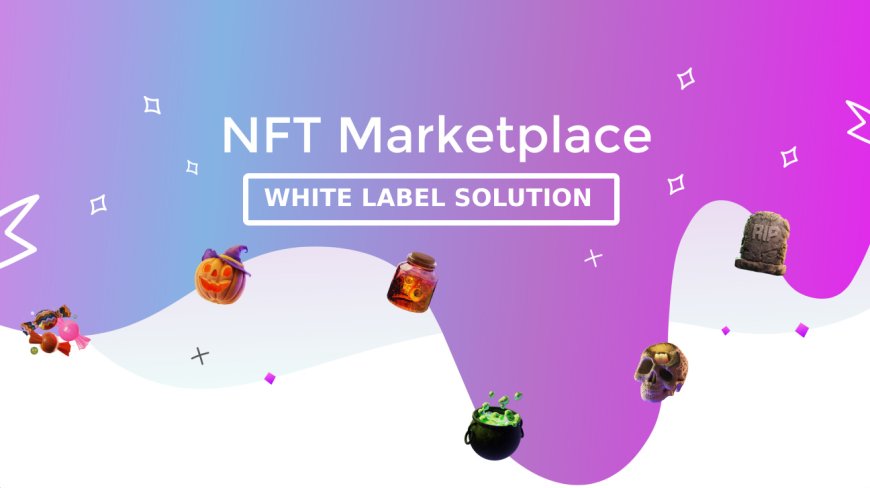10 Features should a White Label NFT Marketplace have

The rise of NFTs (Non-Fungible Tokens) has revolutionized the digital art and collectibles market. To capitalize on this trend, many entrepreneurs are turning to white-label NFT marketplace solutions, which offer customizable, ready-made platforms for buying, selling, and trading NFTs. However, not all white-label solutions are created equal. To ensure a successful launch and operation of your NFT marketplace, it's crucial to include the following ten features.
1. User-Friendly Interface
A seamless and intuitive user interface is paramount for any successful marketplace. Users should find it easy to navigate, search for NFTs, and perform transactions. This involves a clean design, logical layout, and straightforward user journeys. The goal is to minimize friction and make the buying and selling process as smooth as possible.
2. Multi-Blockchain Support
In the evolving world of blockchain, flexibility is key. A robust white-label NFT marketplace should support multiple blockchains, such as Ethereum, Binance Smart Chain, and Polygon. This feature allows users to leverage the benefits of various blockchain networks, such as lower transaction fees or faster processing times, thereby attracting a broader user base.
3. Secure Wallet Integration
Security is a top concern in the crypto space. A white-label NFT marketplace must integrate securely with popular crypto wallets like MetaMask, Trust Wallet, and Coinbase Wallet. This ensures that users can safely store, buy, and sell their NFTs without compromising their private keys or sensitive information.
4. Customizable Smart Contracts
Smart contracts are the backbone of any NFT transaction, governing the terms and conditions under which NFTs are minted, sold, and transferred. A white-label solution should offer customizable smart contracts to meet the unique needs of different marketplaces. This includes royalty payments, auction mechanisms, and more.
5. Scalability
As the popularity of NFTs grows, so will the number of transactions on your platform. A scalable infrastructure ensures that your marketplace can handle increased traffic and transaction volume without performance issues. This is crucial for maintaining a smooth user experience and avoiding downtime during peak periods.
6. Advanced Search and Filtering
A marketplace with a vast number of NFTs needs robust search and filtering capabilities. Users should be able to easily find specific NFTs based on various criteria such as category, price range, artist, or date of creation. Advanced search features enhance user experience and increase the likelihood of successful transactions.
7. Social Features and Community Building
Community is a significant aspect of the NFT space. Integrating social features such as user profiles, commenting, sharing, and following can help build a loyal user base. These features encourage interaction and engagement, fostering a sense of community around your marketplace.
8. Analytics and Reporting
To effectively manage and optimize your NFT marketplace, you need access to detailed analytics and reporting tools. These tools provide insights into user behavior, transaction trends, and overall marketplace performance. With this data, you can make informed decisions to enhance your platform and grow your user base.
9. Robust Customer Support
Providing exceptional customer support is crucial for the success of your NFT marketplace. Users should have access to help and support through various channels, such as live chat, email, and FAQs. Quick and effective customer service builds trust and loyalty, encouraging repeat business.
10. Regulatory Compliance
As the regulatory landscape for digital assets continues to evolve, ensuring compliance with local and international laws is essential. Your white-label NFT marketplace should incorporate features that facilitate compliance with KYC (Know Your Customer) and AML (Anti-Money Laundering) regulations. This not only helps you avoid legal issues but also enhances the credibility and trustworthiness of your platform.
Conclusion
A white-label NFT marketplace offers a quick and efficient way to enter the burgeoning NFT market. However, the success of your platform depends on incorporating essential features that enhance usability, security, scalability, and compliance. By focusing on these ten critical features, you can create a robust and competitive NFT marketplace that attracts and retains users, ensuring long-term success in the digital collectibles space.
Whether you are a startup or an established business, understanding these features will help you select the right white-label solution and tailor it to meet the specific needs of your target audience. As the NFT market continues to evolve, staying ahead with a feature-rich and user-centric marketplace will be key to capturing market share and achieving sustained growth.
What's Your Reaction?



















